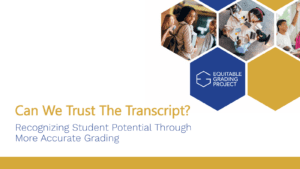
We wanted to share an important and exciting update
Dr. Shantha Smith, our current Vice-President of Programs and Partner Success, will be the company’s new CEO, and we couldn’t be more excited. Dr. Smith

Dr. Shantha Smith, our current Vice-President of Programs and Partner Success, will be the company’s new CEO, and we couldn’t be more excited. Dr. Smith

Our work to improve grading has always created both excitement and pushback: excitement because we give teachers–most of whom get no training in how to

Support Specifically for Education Leaders Leading improved grading work at the school or district level is uniquely challenging. As a former assistant principal, principal, and

https://vimeo.com/1036726698/3286703960 Grading practices have a powerful impact on students’ motivation, mental health, and academic success. When grading is improved, it not only reduces student

“Each year, millions of high school students are receiving grades that don’t represent what they actually know and have learned . . . Yet, they

Professional work environments in the 21st century are all about collaboration and teamwork. We want our students to learn important skills of working together: to

Who makes decisions in schools? Principals frequently promote “shared decision-making” or “distributed leadership” as a signal to teachers that their voices matter. A principal knows

How do electronic gradebooks undermine teachers’ professionalism and anchor them to an inaccurate and unfair grading system? Grading has come a long way from the

“Doubting their own professional judgment, teachers often believe that grades calculated from statistical algorithms are more accurate and more reliable.”–Thomas R. Guskey Teachers, as trained

With all of the pressures and demands on teachers, principals, and districts, why focus on improving how we grade? Grading is more than the final
Search our site for legal insights, services, or resources.